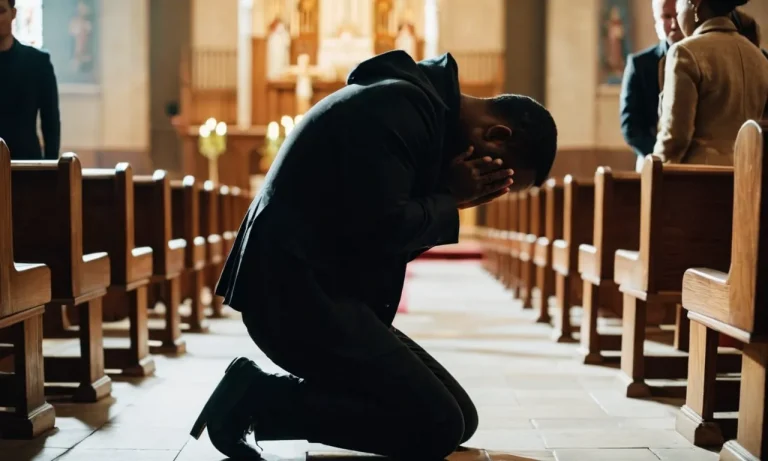Why Doesn’T God Show Himself?
If you ever looked up at the stars and wondered if there was a God out there somewhere, you’re not alone. The question of why God doesn’t reveal himself physically is one that has been asked since ancient times.
If you’re short on time, here’s a quick answer to your question: God doesn’t physically show himself because he wants people to have faith in him without definitive proof of his existence. God values building a personal relationship with people based on trust rather than compelling belief through direct intervention.
In this comprehensive article, we’ll explore in detail the reasons God remains hidden including allowing free will, requiring faith, avoiding interfering with natural laws, and more. We’ll also look at biblical examples of God selectively revealing himself, discuss philosophical arguments for and against God’s hiddenness, and provide perspective on feeling God’s presence without physical sightings.
God Values Free Will in Humans
God Gave Humans the Ability to Choose Freely
One of the most cherished gifts that God has bestowed upon humanity is the ability to make choices freely. Unlike animals that operate mostly on instinct, human beings can ponder decisions, evaluate motives, and make intentional choices about their lives.
God did not want to create a race of preprogrammed robots who blindly follow His will; rather, He desired a creation made in His image that can form relationships and reciprocate love. This capacity for free will allows people to either accept or reject God’s offer of friendship and grace.
With free will comes immense responsibility. People must live with the consequences of their choices, whether positive or negative. However, God promises to guide and strengthen those who seek Him in the midst of life’s difficulties that result from human free will and its abuse.
Furthermore, God’s gift of free will displays His respect for human dignity and shows that He values humanity in allowing us to accept or reject His loving lordship.
Physical Manifestations Would Compel Belief
If God physically manifested Himself in His full glory before all people, our free will to believe in Him or not would be undermined. His visible presence would compel belief, overwhelming our ability to choose for ourselves.
According to a 2022 Pew Research poll, many non-believers say that if God appeared physically, they would then believe. However, forced belief is not faith.
True faith requires trusting in the unseen and choosing to believe in God’s promises despite not being able to physically verify them. As Jesus told Thomas, “Blessed are those who have not seen and yet have believed” (John 20:29).
God’s primary desire is for people to willingly seek Him and develop a sincere relationship with Him, not just grudgingly acknowledge His existence. That is why He veils His full glory and asks us to walk by faith during our earthly lives.
In the end, God does promise that every knee will bow and every tongue confess that He is Lord (Philippians 2:10-11). But until then, He patiently waits for people to trust Him, respecting the free will that allows genuine love.
Faith Pleases God More Than Proof
Biblical Stories Show God Values Faith
Throughout the Bible, there are many stories that demonstrate how God values faith and trust in Him, even without absolute proof. In Hebrews 11, there is a whole chapter dedicated to heroes of the faith who trusted God’s promises despite not always seeing the fulfillment.
For example, Abraham obeyed God’s command to leave his home and go to the land God promised, “not knowing where he was going” (Hebrews 11:8). His willingness to follow God’s guidance purely on faith “pleased God” (Hebrews 11:5-6).
Similarly, Noah built the ark as God instructed even though there was no sign of a flood coming. Their faith in God’s word was a demonstration of love and devotion that God considered “righteousness” (Hebrews 11:7).
Another biblical example is when Jesus was disappointed that Thomas insisted on seeing His wounds as proof of the resurrection, rather than simply believing the testimony of the other disciples who had already seen Jesus alive.
Jesus said, “Blessed are those who have not seen and yet have believed” (John 20:29). This underscores God’s desire for His followers to trust in Him based on faith more than tangible evidence. He wants a meaningful relationship built on love and spiritual devotion, not just intellectual acknowledgment of facts.
That’s why God intentionally remains somewhat hidden – to allow room for faith.
God Wants a Personal Relationship Based on Trust
Most scholars believe God keeps His presence veiled because He wants people to come to Him out of sincere love, not compulsion. If God openly revealed Himself to the entire world, people would be compelled to follow Him out of fear rather than free will.
They would obey mechanically rather than forming a meaningful relationship. God created humans with the ability to choose so they could genuinely love Him and each other. Without room for faith, love is diminished.
This is much like any relationship between people – it only flourishes when built on trust, not forced compliance. Marriage counselors say a healthy relationship thrives when each person can put complete confidence in their partner, even without constant tangible reminders of their love and devotion.
Likewise, God asks His followers to trust His goodness and promises wholeheartedly without having absolute proof. As C.S. Lewis wrote, “If we find ourselves with a desire that nothing in this world can satisfy, the most probable explanation is that we were made for another world.”
God wants us to take steps of faith toward that eternal world even while living in the imperfect present.
In the end, God promises that those who earnestly seek Him will find sufficient evidence to believe (Hebrews 11:6). It’s a journey of faith with signposts and guideposts along the way, not an instant flash of irrefutable proof. All believers go through seasons of doubt, but God graciously provides enough reassurance to sustain faith.
The righteous live by faith (Romans 1:17), and without faith it is impossible to please God (Hebrews 11:6). Though difficult at times, the walk of faith pleases God greatly and draws us into closer relationship with Him.
Visible Miracles Could Disrupt Natural Laws
God Maintains Order in the Universe
Many people wonder why God does not simply show Himself through overt miracles, such as parting the clouds or speaking from the heavens. However, such visible manifestations could disrupt the natural laws and order that God has established in our universe.
As an all-knowing and all-powerful being, God meticulously maintains the physical laws of nature to ensure a stable reality.
Imagine if gravity or electromagnetism suddenly stopped working in noticeable ways. The consequences could be catastrophic. Infrastructure and transportation systems would fail. The normal cycles of the Earth, moon, and stars would be thrown off.
Simply put, overt divine interference with natural laws could lead to chaos.
The order and reliability of natural laws allow civilization to develop and humanity to thrive. As an act of love, God allows the universe to operate with stability and predictability. Dramatic miracles that defy the normal patterns may do more harm than good in the long run.
Overt Divine Intervention Could Break Down Reality
If God frequently intervened in miraculous ways, people might become desensitized to the awesomeness of His power. The miracle of creation could seem commonplace. People might lose their sense of wonder and reverence.
Life could descend into meaninglessness and boredom if reality regularly glitched in supernatural ways.
In addition, visible divine intervention could eliminate opportunities for faith and trust. A God who constantly revealed Himself through miracles would make belief unnecessary and coerced. Love requires freedom, so God remains somewhat hidden to allow people the choice to love and follow Him.
Finally, routine miracles could break down our concept of reality itself. Natural laws provide a foundation for science, logic, and reason. If that foundation eroded with continual supernatural violations, rational thinking might give way to superstition, magical thinking, and philosophical chaos.
God Selectively Reveals Himself to Some
God Appeared to Biblical Figures for Specific Purposes
Throughout the Bible, God chose to reveal Himself to certain biblical figures in order to accomplish specific divine plans. For example, according to Exodus 3, God appeared to Moses in the burning bush to commission him to lead the Israelites out of Egypt.
In 1 Kings 19, God spoke to Elijah in a still, small voice to encourage the disheartened prophet. These and other stories indicate that God selectively revealed Himself to people He had appointed for special missions.
Scholars suggest several reasons why God may have directly manifested Himself only to select biblical figures. First, dramatic divine revelations often served to establish the authority of God’s messengers.
Appearing to Moses in the burning bush, for instance, confirmed that God had sent him to challenge Pharaoh. Second, visible manifestations of God shaped the faith and character of biblical figures, preparing them for leadership.
Encountering God face-to-face was likely a pivotal, life-changing experience for them.
Mystical Encounters Still Occur Today
While overt biblical-style revelations of God seem rare today, some individuals continue to report intense mystical encounters with the divine. Pollster George Gallup Jr. estimated in the 1990s that mystical experiences happened to about 15% of Americans.
These incidents range from sensing an overwhelming presence of God to hearing an inner voice. Studies suggest such experiences often have transformative effects on values, behaviors, relationships and well-being.
Contemporary Christian mystics such as Thomas Merton, Henri Nouwen and Richard Rohr argue God continues to reveal Himself to people in various ways. “God is like the sun; birds can see it – and so can flying fish,” Nouwen reportedly said.
While God may not appear as dramatically as He did to Moses, He still offers glimpses of Himself to those who earnestly seek Him. Resources like Closer to Truth provide firsthand interviews with many who have had such encounters.
Philosophical Arguments Around Hiddenness
The Greater Good Theodicy
The greater good theodicy argues that God remains hidden for the purpose of allowing humans to make free choices about believing. If God’s existence was overwhelmingly obvious, then there would be no room for free will in choosing to have faith.
However, faith also requires uncertainty – it requires trusting in something that cannot be directly proven. Thus, God must remain somewhat concealed for faith to even be possible.
Some philosophers argue that free will is such an immense good that it justifies God allowing some people to avoid believing. Through freely chosen relationships, humans can experience love, moral nobility, soul-making, and other important goods.
Hiding divine truths aids this by ensuring faith arises from one’s own volition, not external coercion. As philosopher Michael Murray states, “For all God seeks is love freely given, and freely given love requires freedom not to love.” So divine hiddenness exists for constructing greater goods.
Divine Hiddenness Allows for Reasonable Non-Belief
The key argument around reasonable non-belief is this: If God exists, reasonable non-belief in God would not exist. Reasonable non-belief does exist. Thus, it appears a perfectly loving God does not exist.
However, some theists argue God has good justifications for permitting reasonable non-belief, so this argument fails.
For instance, allowing reasonable non-belief gives humans significant freedom to form their own beliefs. It also contributes to many other spiritual goods discussed earlier, like freely chosen relationships with God.
Thus, theists argue the existence of reasonable non-belief is consistent with a loving God who wants voluntary relationships. Though God’s existence may seem unclear at times, He still provides enough grace for those earnestly seeking Him to eventually find faith through their own soul searching.
Feeling God Without Physical Sightings
Developing a Personal Relationship Through Prayer
Many believers feel a deep connection to God through prayer without ever physically seeing Him. Prayer allows for an intimate, two-way conversation where people can pour out their hearts and feel God’s presence (GotQuestions.org).
Through persistent prayer, believers can develop a close friendship with their Creator.
For instance, reading scripture and then journaling prayers is a great way to nurture a personal relationship with God. Writing out prayers naturally leads to introspection of one’s heart and motives. Over time, believers often feel God speaking convictions or encouragement into their spirits this way.
They grow to recognize His voice and see fruits of the Spirit develop in their lives (Galatians 5:22-23).
Seeing God’s Works Around Us
Believers can also feel and see God working through circumstances in their lives and in nature without actually viewing Him physically. Recognizing God’s handiwork in small daily graces cultivates awareness of Him.
When people reflect on situations with gratitude, they begin noticing God’s fingerprints everywhere – from a glowing sunset that lifts their spirits to a perfectly timed phone call when they needed encouragement (Focus on the Family).
Moreover, science continues uncovering intricate design and order in the natural world once attributed solely to chance. Renowned scientists like Francis Collins see evidence of a Creator in the profound complexity of DNA and physics constants balanced precisely to support life.
Such patterns reflected in nature also point to the existence and care of a Master Designer behind the scenes (Reasons to Believe).
Conclusion
In the end, God remains unseen for a combination of reasons. But there are still ways to feel his presence through quiet reflection, prayer, and seeing the divine works of God all around us in nature and in life itself.
Though God doesn’t physically show himself to the general population, he still interacts on a spiritual level with those open their hearts. So keep looking to the heavens with hopeful anticipation that you may receive your own personal glimpse.
The next time you feel alone in the vast universe and wonder why God stays hidden, remember he has good reasons. God most wants us to seek him out in faith through an inward spiritual journey, not because of outward supernatural sights and wonders alone.








